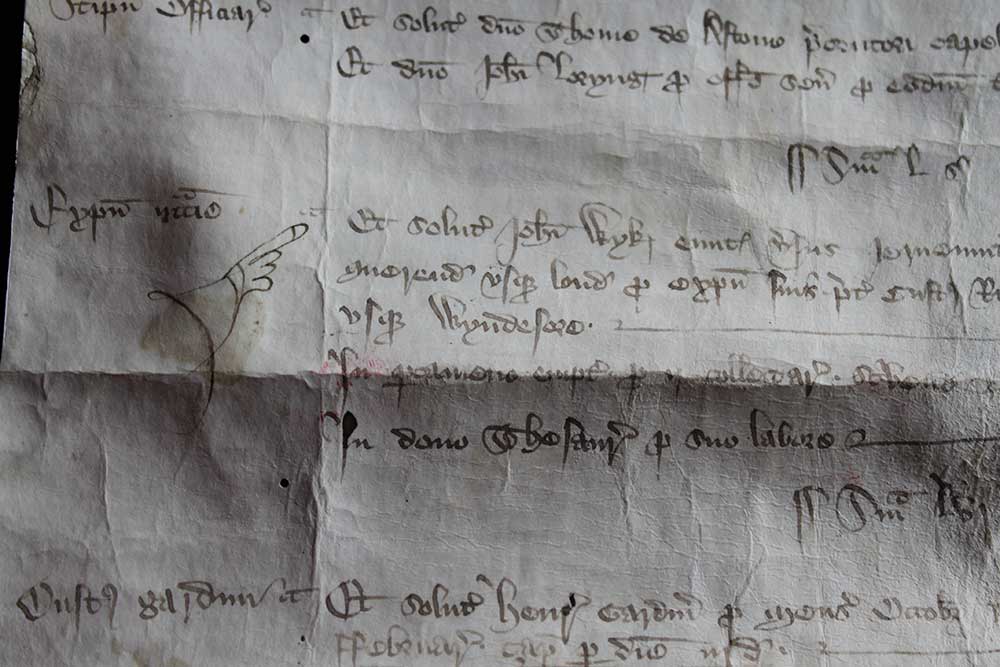In October I started my traineeship at St. George’s Chapel Archives specialising in traditional skills. The past nine months have been filled with new experiences, people and opportunities, and it’s now my turn to reflect on my time, so far, as a Transforming Archives trainee.
Through studying medieval history at university, I discovered a love of Latin and palaeography. However, trying to find a role where skills in these subjects are required is not exactly an easy task. When I found the advertisement for this traineeship I thought it was a fantastic opportunity for me to build on my preexisting skills and to develop those necessary for a career in archives.
My traineeship is based at St. George’s Chapel Archives located within the walls of Windsor Castle. The Archives and Chapter Library are housed in one building, containing books, manuscripts, maps, drawings, photographs, letters and various other items that trace the history of the College of St. George. The earliest documents found in the Archives date from the 12th century.

Pointed finger (manicule) found in an Account Roll from the period 1375-6 (catalogue reference: SGC XV.34.10)
The main project I work on in this traineeship is the transcription and translation of Treasurers’ Account Rolls from the 14th century. These rolls record valuable information about College finances, from how much was paid to the clergy and lay clerks, to how much was spent on building new houses. Even the cost of onion seeds, ingredients for verjuice and dung to fertilise the garden are recorded in these rolls, giving a brief glimpse into the minutiae of everyday, 14th century life. Stumbling across additions to the margins of these rolls always brings a smile to my face, especially the cartoonish pointed fingers known as manicules. One such manicule I came across formed the basis of an excellent feature on the Archives’ website by my colleague, Kate, Assistant Archivist at St. George’s Chapel Archives.
A substantial project I contributed to was the creation of an exhibition for St. George’s Chapel entitled, ‘To be a pilgrim: medieval pilgrims at Windsor’. This exhibition focuses on the Chapel’s history as a site of medieval pilgrimage and runs until March 2017. This was a fantastic opportunity for me to discover exactly how to plan, research and deliver an informative and effective exhibition. I found the experience of writing content as well as sourcing images and items for the exhibition cases really enjoyable. It is a wonderful way to contribute to the visitors’ experience at St. George’s Chapel and Windsor Castle.
When my nose isn’t buried in Account Rolls, I really enjoy taking part in engagement activities. As part of my role, I have given talks on items exhibited in the Archives to tour groups. This is an essential aspect of my work because I believe it is important to engage with people to promote knowledge of the Archives, its collections and the wealth of information they hold. I have also assisted at events run by the Archives, primarily those which constitute part of the Archives innovative Adopt-a-Book programme. As I mentioned above, the Chapter Library is housed with the Archives. The Library contains over 6,000 rare books all of which need to be cared for and preserved. In order to raise the funds for conservation, the Archives offers an Adopt-a-Book scheme. By making a donation of £50 or more, books in the Library can be adopted. In return, the adopter chooses the wording for a bookplate to be placed in the book, and receives a certificate with a copy of the bookplate accompanied by the name of the title and author. Adopters are also invited to special annual events. Adopting a book is a truly unique way of celebrating an event or memorialising a person and it is a pleasure to help people select a book that is personal and meaningful to them.
One of the distinct advantages of the Transforming Archives traineeship is the opportunity to take part in additional training. As many of the trainees have already mentioned in their blogs, each one of us has an additional training budget enabling us to attend lectures, conferences, training events and courses that not only complement our specialisms but also address gaps in our skills. Having access to this budget means, for me, the ability to consolidate and develop both traditional and digital skills.
We have also had training days in London and Edinburgh exclusively for the Transforming Archives trainees and Opening Up Scotland’s Archives trainees. These were fantastic opportunities, firstly to meet the other trainees and find out about their experiences in their respective archives and secondly, to meet professionals working in the archives sector and learn about their career paths and choices.
My hope is to continue to work in this sector and complete a postgraduate course in the near future. In the meantime, I have just under three months of my traineeship left to complete and I still have a lot to do! I’ll be finding out about community archives and the issues they face, before heading off to the Shakespeare Birthplace Trust for a week to see what exactly Beth does there – and that’s just the next three weeks! Then in the archives there’s cataloguing to do, enquiries to answer and Account Rolls to translate and maybe, just before I finish, in the margin of one of those rolls, I’ll find another wonderful manicule to put a smile on my face.
Lovely to see how much you are enjoying the adventure of exploring our past through what are often seen (quite wrongly I think) as dry accounts.